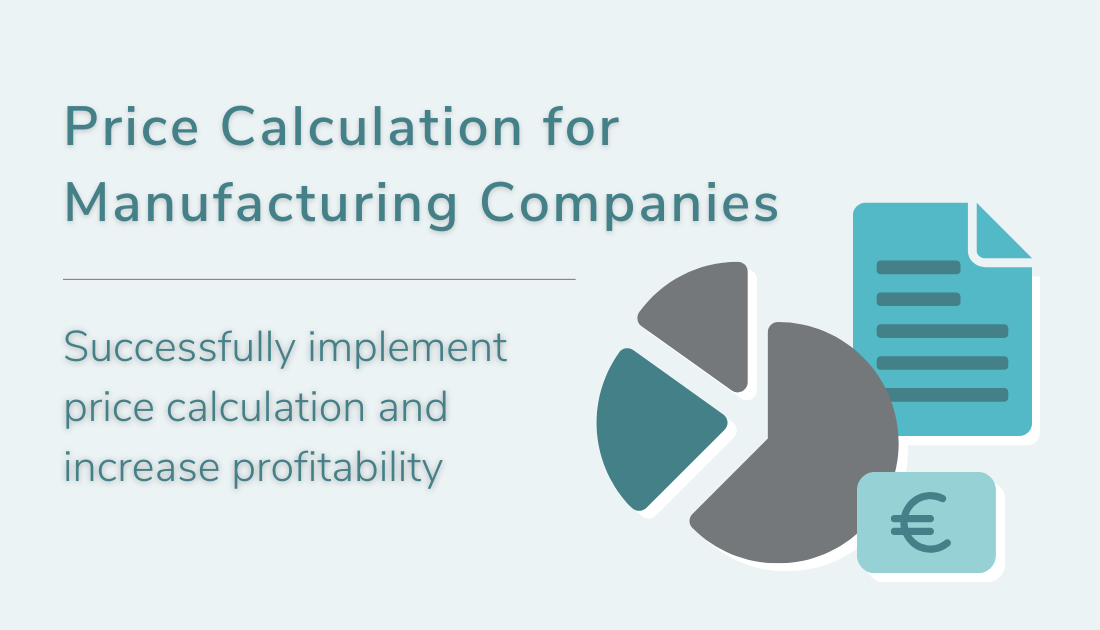Sound price calculation is a decisive success factor and a complex challenge in the manufacturing industry.
This process can take several days and requires considerable resources from various departments.
Our guide reveals proven methods and innovative strategies for optimizing your price calculation. Discover how to control costs efficiently and master the complexity of costing.
TABLE OF CONTENTS
- What is a price calculation?
- Why do you need a price calculation?
- Product or product cost calculation
- Order costing (also quotation costing, preliminary costing, overhead costing)
- Price calculation: What you need to pay attention to
- 4 steps to successful price calculation in manufacturing
- Optimize your price calculation with the right calculation software
WHAT IS A PRICE CALCULATION?
Pricing, or price calculation, refers to the general estimate of the costs associated with manufacturing, selling, or providing a product or service.
It comprises the analysis of production costs, market and customer conditions, and strategic corporate goals. The main objective of the price calculation is to establish competitive sales prices and ensure a project's profitability.
WHY DO YOU NEED A PRICE CALCULATION?
Accurate pricing is a critical success factor for any business, whether setting the selling price of a new product or creating a competitive, quick quote for a customer.
For suppliers, a bid price that is too high results in an order going to a cheaper competitor. An offer that is priced too low can mean years of losses. The challenge is correctly calculating numerous future costs based on incomplete information and volatile cost components.
Price calculation is, therefore, one of the most crucial business processes and lays the foundation for the profit or loss of a project.
A well-founded price calculation offers several advantages:
- Competitive advantage through precise pricing
- Cost control and identification of potential savings
- Strategic planning and long-term profitability analysis
- Secure implementation of pricing strategies and sustainability targets
PRODUCT OR PRODUCT COST CALCULATION
Product costing is fundamental to the price calculation process for new products and at every stage of the product life cycle.
A product's direct and indirect costs are analyzed to make a well-founded price decision. This calculation considers material costs, production costs, and overhead costs.
ORDER COSTING (ALSO QUOTATION COSTING, PRELIMINARY COSTING, OVERHEAD COSTING)
Quotation costing refers specifically to the calculation of costs in connection with a specific quotation for a customer.
In quotation costing, specific service or product costs are calculated for a specific customer or customer group.
In contrast to general price calculation, which is based on general costs, quotation calculation focuses on the specific costs associated with a particular quotation. It may also consider customer-specific requirements or discounts.
PRICE CALCULATION: WHAT YOU NEED TO PAY ATTENTION TO
The price calculation process involves various stakeholders and must fulfill different requirements.
Sustainability: A must for manufacturing companies
Sustainability poses considerable challenges for manufacturing companies in the context of price calculation. A key aspect of sustainable product costing is disclosing product carbon footprint (PCF) data and price information.
Legal regulations and industry standards increasingly require this transparency. Companies must comply with government regulations, ESG guidelines from company boards and the demands of shareholders, who are all pushing for "climate-neutral production" and a "sustainable supply chain".
The EU Climate Law aims to achieve a climate-neutral EU by 2050, and similar initiatives, such as climate deals in the USA, illustrate the regulatory pressure. These regulations are forcing companies to incorporate sustainability into their pricing strategies.
Good to know
Car manufacturer Daimler wants to use climate-neutral production as a criterion for selecting suppliers. Similarly, companies such as Continental, Mercedes-Benz, Ford, and BASF are setting their own climate targets, with top management linking bonuses to sustainability targets.
Companies can seamlessly integrate emissions assessments into cost estimates and quotations by integrating calculation and emissions data into a common system.
This approach allows for evaluating cost reductions while considering sustainability, such as relocating production sites. Reconciling product costs and emissions across the entire bill of materials facilitates cross-departmental cost assessments and increases transparency.
Complexity: How to maintain an overview
One of the biggest challenges is mastering the complexity of cost assessment. Manufacturing companies often have to map extensive bills of materials and complex manufacturing processes.
Incorrect calculations, especially in cross-country cost analyses, are often caused by manual spreadsheet entries. To ensure accuracy, a central master database is essential.
Using spreadsheets for cost estimation and price calculation proves unreliable and inefficient in complex value-added structures. Manual input and data linking increase the risk of inaccuracies and make consistent cost assessment more difficult.
Avoid the pitfalls of spreadsheets and look for solutions that make your processes more efficient and precise. Software support has a decisive advantage: it centralizes managing the required data. All information is easily accessible, and all employees calculate based on valid and consistent data.
Consideration of industry-specific requirements and processes
Nowadays, customers in the automotive industry expect a binding offer within two to three weeks of their inquiry.
This need can also be observed in other sectors, such as mechanical engineering, aerospace, and defense. Precise and rapid price calculation can represent a significant competitive advantage.
In the automotive industry, other specific requirements influence the entire price calculation process, such as creating quotation breakdowns and using OEM-specific calculation templates. Specialized software solutions play a crucial role in ensuring compliance with OEM requirements.
4 STEPS TO SUCCESSFUL PRICE CALCULATION IN MANUFACTURING
If you work in the manufacturing industry, you should follow these four steps to successful price calculation:
Step 1: Carry out a profitability analysis
- Consolidate all relevant cost data to determine the profitability of the project.
- Use dynamic profitability calculations to assess the project value based on key figures such as present value, discounted cash flow, return on sales, amortization time, or break-even.
Step 2: Create comprehensive reports
- Develop specific analytics and reports to provide insight to management during the bid process. These reports will serve to provide management and project management with ad hoc information on the current costing status during the process.
- To identify opportunities and risks in the calculation at an early stage, include location comparisons, cost structure analyses, and risk assessments.
Step 3: Implement open book accounting
- Disclose sales prices transparently to customers and ensure that accounting is detailed and accurate to meet customer expectations.
- If older offers are available, the data must be compared with the new offer. A previously quoted sales price must also be quoted consistently in the future, and price differences must be comprehensible.
Step 4: Maintain costing history
- Update calculations immediately to reflect changes in parameters such as raw material prices, exchange rates, or discounts granted.
- Keep a careful record of cost changes to track cost development and support design-to-cost processes.
OPTIMIZE YOUR PRICE CALCULATION WITH THE RIGHT CALCULATION SOFTWARE
A well-founded price calculation is essential for a manufacturing company's success. Companies can increase their competitiveness and profitability by optimizing costing processes and using modern technologies.
Manufacturing companies should continuously review and adapt their costing strategies to meet rapidly changing market requirements.
The calculation process is complex and requires large amounts of data, often scattered across different systems. This fragmentation can significantly impair efficiency and accuracy. A specialized, integrated tool offers optimal data management in this case.
FACTON's costing software is ideal for the automotive supplier industry. It offers industry-specific functions such as automatic data transfer from the quotation calculation to the OEM's final quotation template and sustainable product costing functionalities.
Discover all functions of FACTON EPC and find out how you can optimize your price calculation with our solution.



